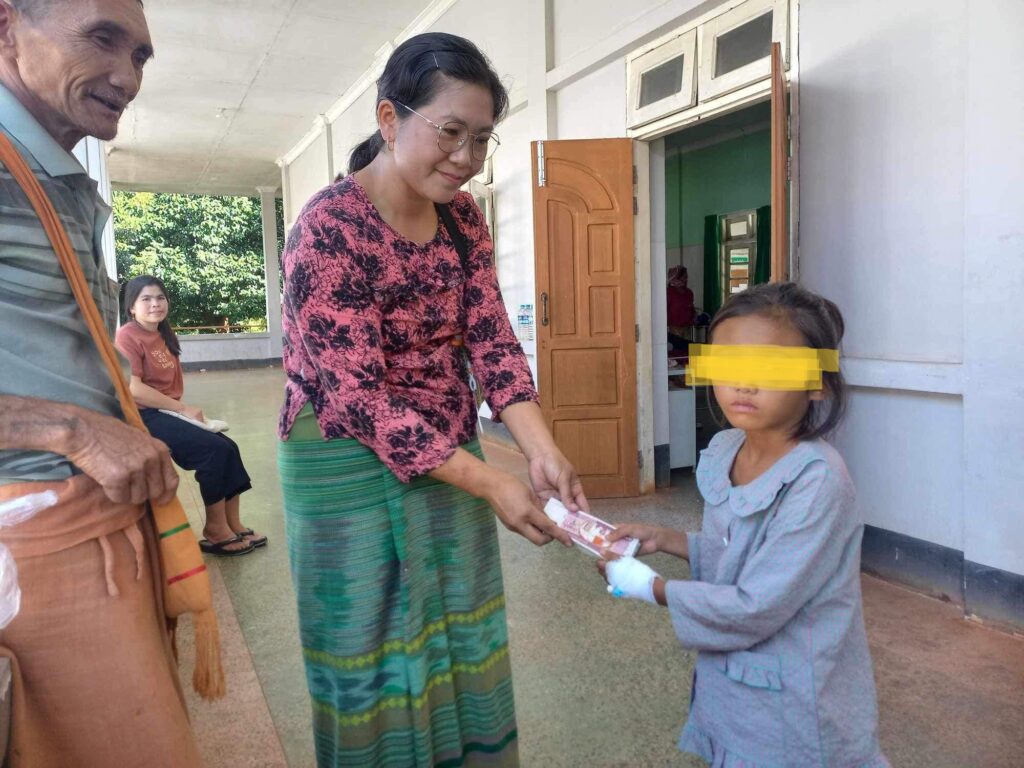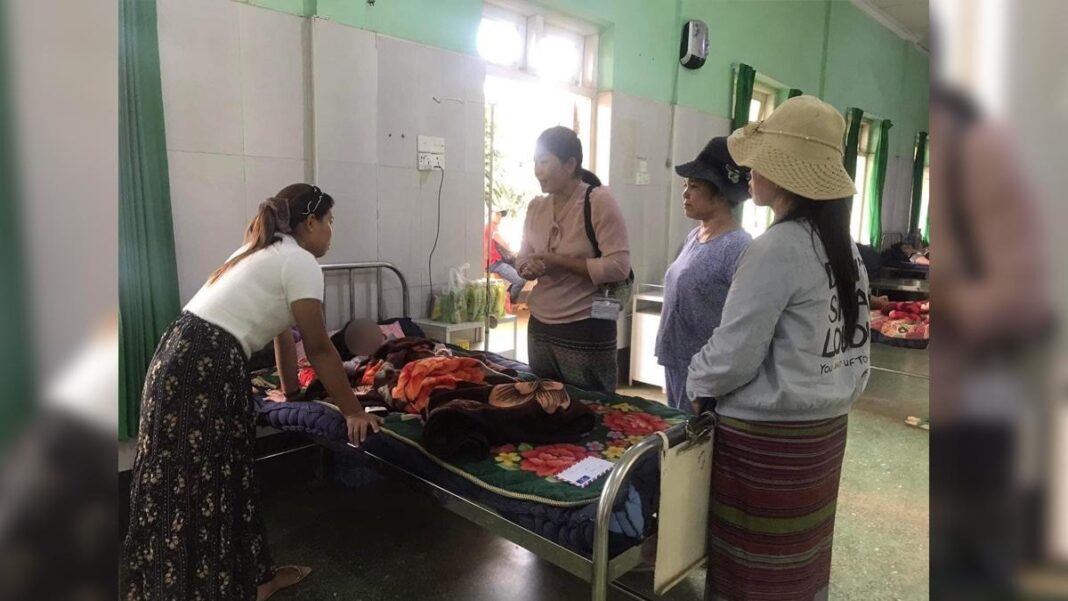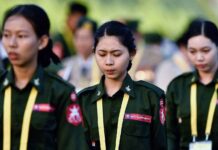A 7-year-old girl named Nang Ngin Noom, dressed in a white and green school uniform, lies on a hospital bed, whispering in pain.
Nang Ngin Noom is a student of the first grade at a primary school in Ho Nam village, located in the Mineshu (Mongsu) township in Southern Shan State.
On the 9th of last October, the day of the exam, the girl informed her teacher that “she is not ready or she hasn’t been able to study the assigned lesson to be tested.” In response, the teacher beat her up severely, causing serious injuries to her face and head.
“After beating, the girl started crying,” recounted sadly one of the girl’s relatives named Nang Hsai. “Her grandmother went to pick her up from school, but by that time, the girl had already lost consciousness. She was immediately taken to Mongsu hospital overnight.”
Because of the severity of the child’s injuries, the doctors at Mongsu Hospital were unable to provide the necessary care. As a result, she was transferred to the Public Hospital in Taunggyi, the capital of Shan State. However, due to the family’s inability to cover the medical expenses, a decision was made to move her to a more affordable military hospital in Kholam.
Currently, the young girl is undergoing medical treatment at the 80-bed military hospital in Kholam.
According to her classmates who witnessed the incident, they reported, “The teacher kicked her with her feet and struck her with a stick, primarily targeting her head.”
Nang Ngin Noom has been residing with her grandparents, as her parents have had to work as migrant laborers in Thailand. They have been compelled to seek employment there due to the political upheaval and economic challenges, which have made it difficult for them to sustain their livelihood.
“Nang Ngin Noom’s grandmother is deeply distraught and in tears. She doesn’t know what to do,” expressed Nang Hsai.
Nang Ngin Noom’s injuries have slightly improved, but there are still dark circles around her eyes, and her condition has not fully returned to normal.
“Now the child is somewhat better, but she is still not allowed to eat solid food or rice. She is only permitted to have porridge,” Nang Hsai shared the current situation of the girl.
“She can now get up from lying down, but she is unable to remain seated for an extended period. She is dealing with internal injuries and pain, and there is a need for extreme caution, particularly concerning her head,” said a woman who visited the hospital to assist in caring for the girl at the Kholam military hospital.

“The head is a very delicate area, and harm to it can even be fatal. The era of beating children because they can’t perform well in tests or for any reason is over. Resorting to violence because they struggle to understand the lesson will only discourage children from attending school,” the woman remarked, emphasizing the detrimental impact of such actions on a child’s motivation to learn.
The school teacher who inflicted serious injuries upon Nang Ngin Noom is facing consequences from the relevant township administrative office, although the specific details are not yet known, according to the girl’s aunt, Nang Hsai.
This incident highlights the alarming fact that the physical punishment of children in schools, a clear violation of their rights, continues to occur in rural areas across Shan State.
A similar incident occurred last August 18th when the principal of Primary School No. (6) in Kyaing Tong (Keng Tung) township beat a child’s head for the simple reason of not having her nails cut.
“Inflicting harm and beating children not only causes physical injuries but also deeply affects them emotionally and psychologically. Children’s minds are fragile, easily hurt, and sensitive, making them susceptible to trauma. These abusive acts are detrimental, demotivating children and pushing them away from schools,” emphasized a human rights activist woman in her 30s from Shan State.
Educational staff play crucial roles in shaping and guiding children. They are expected to employ non-violent, compassionate, and constructive approaches in mentoring and teaching the children, the rights activist further emphasized.
Beating children to the extent that it causes injuries and visible marks not only constitutes a violation of human rights but also carries legal consequences, stated a lawyer who prefers to remain anonymous.
“Anyone found guilty of emotional, physical abuse, or any form of violence against children, provided there is sufficient evidence, can face imprisonment ranging from one to six months. Additionally, a minimum fine of one hundred thousand kyat to a maximum of three hundred thousand kyat may be imposed. In some cases, a combination of imprisonment and fine can be levied,” explained the lawyer, outlining the legal penalties for such abusive actions against children.
Furthermore, the lawyer emphasized that coercing children to purchase alcohol or beer, selling such substances to them, and taking them to day clubs, nightclubs, karaoke bars, or massage establishments without the presence of their parents or guardians can result in legal prosecution.
The violations of human rights have notably escalated and worsened following the military coup. Among these incidents, there has been an increase in abuse perpetrated by educational department staff against students and children, as highlighted by a rights activist.
In the current situation, there is no established system to file a complaint in the event of human rights violations. Furthermore, organizations dedicated to human rights issues are facing limitations and challenges in their responsiveness and presence.
In Myanmar, individuals under the age of 18 are legally defined as children.
In response to the incident of a child being beaten, a 35-year-old mother of four children, all of whom are students, expressed her sympathy, saying, “I empathize with the girl and her family, and I’m at a loss for words. Such incidents are absolutely unacceptable. If I were to witness such an occurrence, I would take action to the fullest extent,” she firmly commented.
School teachers should refrain from resorting to violent behavior such as physically punishing children. Instead, they should opt for explanation and discipline in a constructive manner to ensure children can understand and learn, emphasized a woman who is also a mother.
“I strongly believe that teachers who cause harm and inflict injuries on children should face severe consequences. Without strict penalties, such abusive behavior among teachers towards children will continue,” urged the concerned 35-year-old mother.

















Leave a Comments